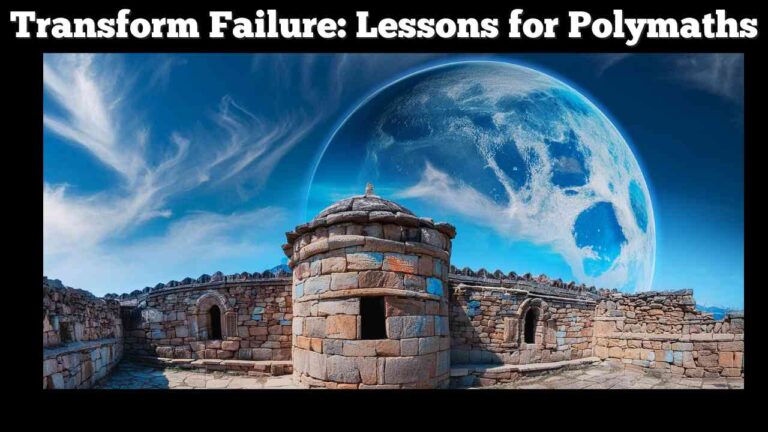Introduction
Embracing failure as a stepping stone rather than a stumbling block is a crucial mindset for polymaths striving for growth and development. In a world where versatility and adaptability are essential, understanding how to transform setbacks into opportunities can empower polymaths to reach new heights. How can one turn the sting of failure into the fuel for success? This guide explores the transformative power of failure in the growth process, offering insights and strategies that inspire and educate polymaths on their journey toward excellence. Dive in to discover how every misstep can become a vital part of your polymath development.
Embracing Failure for Growth
Understanding Failure
Failure is often perceived as a final, negative outcome, but it is much more complex and instructive. For polymaths, failure represents an essential component of the growth process. It is not an endpoint but a learning opportunity—a data point in the broader experiment of polymath development. Each failure provides critical insights into what doesn’t work, allowing for recalibration and refinement of skills and approaches. By embracing failure, polymaths can dismantle the fear of making mistakes, fostering a mindset that values resilience and continuous improvement. This shift in perspective turns failure into a necessary ingredient for success and innovation. Recognizing failure as a valuable teacher rather than a formidable adversary is the first step in transforming setbacks into opportunities for growth.
The Growth Process
The growth process for polymaths is inherently iterative and non-linear. It involves a series of trials, errors, reflections, and adjustments. Each failure encountered is a stepping stone that contributes to a deeper understanding and mastery of diverse fields. By viewing the growth process as a journey rather than a destination, polymaths can appreciate the value of incremental progress. This approach encourages continuous learning and adaptability, essential traits for anyone navigating multiple disciplines. Embracing the growth process means acknowledging that setbacks are integral to achieving long-term success. By integrating lessons learned from failures, polymaths can fine-tune their strategies and approaches, ultimately leading to more innovative and effective solutions. In this way, the growth process becomes a dynamic cycle of improvement and development, driven by the transformative power of failure.
Learning from Setbacks
Learning from setbacks is a crucial part of polymath development. When failures occur, the first step is to analyze what went wrong and why. This process involves critical self-reflection and a willingness to confront uncomfortable truths. By identifying the root causes of setbacks, polymaths can develop strategies to avoid similar pitfalls in the future. Moreover, setbacks often highlight gaps in knowledge or skills, providing a roadmap for further learning and improvement. Embracing these lessons fosters resilience and adaptability, essential qualities for anyone navigating multiple disciplines. Instead of viewing setbacks as mere obstacles, polymaths can reframe them as opportunities for growth and innovation. This mindset shifts the focus from the negative aspects of failure to the valuable insights it can provide, ultimately driving continuous progress and development.
The Polymath Mindset
Polymath Development
Polymath development is a lifelong journey that requires a unique mindset characterized by curiosity, resilience, and adaptability. Unlike specialists who focus deeply on a single field, polymaths thrive on exploring diverse disciplines and integrating knowledge across various domains. This breadth of learning enables polymaths to innovate and solve complex problems with a multifaceted approach. To cultivate this mindset, polymaths must embrace continuous learning and remain open to new experiences and ideas. They must also develop the ability to pivot and adapt when faced with challenges, seeing each failure as an opportunity to gain deeper insights and refine their skills. By fostering a growth mindset, polymaths can transform setbacks into powerful learning experiences, ensuring that their development is both dynamic and expansive. This approach not only enhances individual capabilities but also contributes to broader innovation and progress across multiple fields.
Diverse Influences
Diverse influences are essential for nurturing the polymath mindset. Exposure to various fields, cultures, and perspectives enriches the learning experience, enabling polymaths to draw connections and insights that might otherwise go unnoticed. This diversity fosters creativity and innovation, as blending different ideas often leads to novel solutions. Polymaths can benefit from actively seeking out and engaging with a wide range of disciplines—whether through reading, networking, or hands-on experimentation. By integrating knowledge from disparate sources, polymaths can develop a more holistic understanding of complex problems. This approach not only broadens their intellectual horizons but also equips them with the tools to adapt and thrive in an ever-changing world. Embracing diverse influences ensures that polymath development is robust, versatile, and capable of driving meaningful advancements across multiple domains.
Content Creation Techniques
Content creation techniques are vital for polymaths, as they enable the effective communication of complex ideas. One key technique is storytelling, which helps to make multifaceted concepts more relatable and engaging. By weaving narratives that connect different fields of knowledge, polymaths can provide unique insights and inspire their audience. Another important technique is the use of visual aids such as infographics, diagrams, and videos, which can simplify and illustrate intricate topics. Additionally, adopting a modular approach to content creation allows polymaths to repurpose and adapt their work for various platforms and audiences. This not only maximizes reach but also ensures that the content remains dynamic and relevant. Lastly, collaboration with experts from different domains can enrich the content, providing depth and diverse perspectives. By mastering these techniques, polymaths can effectively share their knowledge and foster a deeper understanding across a wide range of subjects.
Transforming Failure into Opportunity
Reframing Failure
Reframing failure is a powerful technique that allows polymaths to transform setbacks into valuable opportunities for growth. Instead of viewing failure as a negative endpoint, it’s essential to see it as a crucial part of the learning process. This shift in perspective enables polymaths to extract lessons from their mistakes and apply them to future endeavors. One effective way to reframe failure is by adopting a growth mindset, which emphasizes that abilities and intelligence can be developed through dedication and hard work. Another strategy is to focus on the specific feedback that failure provides, using it to identify areas for improvement and skill refinement. By celebrating small wins and progress, even amid setbacks, polymaths can maintain motivation and resilience. Ultimately, reframing failure fosters a proactive approach to challenges, ensuring that each misstep becomes a stepping stone toward greater achievements and innovation.
Practical Strategies
Implementing practical strategies can help polymaths turn failure into a stepping stone for success. One effective strategy is to maintain a failure journal. Documenting each setback, along with the lessons learned, helps to track progress and provides a resource for future reference. Another approach is to set incremental goals, breaking down larger tasks into manageable steps. This not only makes complex projects less daunting but also allows for regular reflection and adjustment. Additionally, seeking feedback from mentors or peers can provide valuable insights and different perspectives on overcoming obstacles. Practicing resilience through mindfulness and stress management techniques can also prepare polymaths to handle setbacks more constructively. By integrating these strategies, polymaths can systematically convert failures into learning opportunities, ensuring continuous growth and development. These practical steps cultivate a mindset that values perseverance and adaptability, essential traits for thriving in diverse fields.
Success Stories
Success stories of polymaths who have transformed failure into opportunity serve as powerful examples and sources of inspiration. Consider Thomas Edison, who famously remarked on his numerous failed attempts to create the light bulb: “I have not failed. I’ve just found 10,000 ways that won’t work.” Edison’s perseverance and ability to reframe failure were key to his eventual success. Similarly, Leonardo da Vinci faced numerous setbacks throughout his diverse pursuits in art, science, and engineering. His relentless curiosity and willingness to learn from failures allowed him to make groundbreaking contributions across multiple fields. Another modern example is Elon Musk, who has experienced public failures with ventures like SpaceX and Tesla but used those experiences to drive innovation and achieve remarkable progress. These stories highlight the resilience and adaptability that characterize successful polymaths, demonstrating that failure, when embraced and leveraged, can lead to extraordinary achievements.
Encouraging Exploration
Exploring New Fields
Exploring new fields is integral to the polymath journey. Venturing into unfamiliar disciplines can spark creativity and lead to unexpected innovations. One effective approach is to start with areas that naturally pique your curiosity. Dive into foundational resources such as introductory books, online courses, or seminars to gain a basic understanding. Engaging with communities or experts in those fields can provide deeper insights and foster valuable connections. Additionally, integrating knowledge from new fields into your existing expertise can create synergies, leading to novel solutions and perspectives. For instance, a polymath with a background in engineering and an interest in biology might explore bioengineering, merging principles from both disciplines to drive advancements. By continuously challenging themselves to step out of their comfort zones, polymaths can expand their intellectual horizons and remain adaptable in an ever-evolving world. This exploratory mindset not only enriches personal growth but also contributes to broader societal progress.
Continuous Learning
Continuous learning is a cornerstone of polymath development. In a rapidly changing world, staying updated with the latest advancements across various fields is essential. This involves cultivating a habit of lifelong learning through diverse methods such as reading, attending workshops, online courses, and engaging in discussions with experts. Polymaths should leverage digital resources like MOOCs (Massive Open Online Courses) and educational platforms to explore new topics at their own pace. Additionally, setting aside dedicated time for self-education ensures consistent progress. Embracing a curiosity-driven approach not only deepens existing knowledge but also opens doors to new areas of interest. This relentless pursuit of knowledge fosters adaptability and innovation, key traits for thriving in multiple domains. By committing to continuous learning, polymaths can keep their skills relevant and their minds sharp, ultimately driving personal growth and contributing to broader intellectual and societal advancements.
Building Resilience
Building resilience is crucial for polymaths who navigate multiple fields and face frequent challenges. Resilience enables them to bounce back from setbacks and persist in their exploratory endeavors. One effective method to build resilience is to practice mindfulness and stress management techniques, such as meditation and deep breathing exercises. These practices help maintain mental clarity and emotional balance during difficult times. Additionally, setting realistic goals and celebrating small achievements can boost morale and motivation. Developing a strong support network of mentors, peers, and like-minded individuals also provides encouragement and valuable advice. Learning to view failures as temporary setbacks rather than insurmountable obstacles is key to maintaining a positive outlook. By fostering resilience, polymaths can sustain their passion for exploration and continuous learning, ensuring they remain adaptable and innovative in their pursuits. This resilience not only supports personal growth but also enhances their ability to contribute meaningfully across various domains.
Crafting a Compelling Narrative
Storytelling for Polymaths
Storytelling is a powerful tool for polymaths, enabling them to convey complex ideas in an engaging and relatable manner. By crafting narratives that weave together insights from various fields, polymaths can highlight the interconnectedness of knowledge and inspire their audience. A compelling story often begins with a clear and relatable problem, followed by a journey of exploration and discovery. Polymaths can use their diverse experiences to illustrate how different disciplines contribute to solving the problem. Incorporating personal anecdotes and real-world examples can make the narrative more relatable and impactful. Additionally, using visual aids such as diagrams, infographics, and multimedia can enhance understanding and retention. Effective storytelling also involves a strong conclusion that not only summarizes key points but also poses thought-provoking questions or calls to action. By mastering storytelling, polymaths can effectively communicate their ideas, foster understanding, and inspire innovation across a broad audience.
Engaging Your Audience
Engaging your audience is essential for crafting a compelling narrative as a polymath. To capture and maintain interest, it’s important to know your audience and tailor your content to their needs and preferences. Start by posing intriguing questions or presenting scenarios that resonate with them. Use relatable language and avoid jargon to ensure accessibility. Interactive elements such as polls, quizzes, and discussions can also foster engagement and make the audience feel involved. Additionally, incorporating varied content formats—like videos, podcasts, and infographics—can cater to different learning styles and keep the audience engaged. Storytelling techniques such as suspense, humor, and emotional appeals can make your narrative more captivating. Regularly soliciting feedback and being responsive to your audience’s input can further enhance engagement and build a sense of community. By focusing on these strategies, polymaths can effectively engage their audience, making their narratives not only informative but also memorable and impactful.
Authentic Content
Creating authentic content is key to building trust and credibility as a polymath. Authenticity involves sharing genuine experiences, insights, and emotions that resonate with your audience. To achieve this, focus on transparency and honesty in your storytelling. Acknowledge your challenges and failures, and discuss how you’ve learned and grown from these experiences. This vulnerability makes your narrative relatable and inspiring. Additionally, ensure that your content reflects your true voice and perspective, rather than trying to mimic others or follow trends superficially. Authentic content also means providing value—offering original ideas, practical advice, and actionable insights that genuinely help your audience. Engaging in meaningful interactions and responding thoughtfully to feedback further reinforces authenticity. By consistently producing genuine and valuable content, polymaths can establish a strong, trustworthy connection with their audience, fostering long-term engagement and loyalty. Authenticity not only enhances the impact of your narrative but also strengthens your personal and professional brand.







